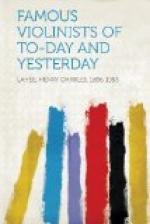When Mendelssohn was appointed conductor of the Gewandhaus concerts at Leipzig, he sent for David and made him concert master, which post he occupied from 1836. Seven years later the conservatory was founded by Mendelssohn, and David became professor of violin, in which position his influence became great and beneficial.
In Leipzig David established a quartet, which was one of the best, if not the very best, in its day, though it may have been surpassed later by the Florentine Quartet and those of Joachim, in London and Berlin, and possibly by Brodsky’s later Leipzig quartet.
David died in 1873, beloved and respected, and will be remembered as one of the most refined musicians and admirable teachers of the century.
Josef Hellmesberger, one of the most brilliant violinists and noted teachers of Vienna, founded, in 1849, a quartet which achieved an immense reputation. His associates were Heissler, Durst, and Schlesinger. Hellmesberger made a point of finding works of merit which had sunk into oblivion, but which were worthy of a hearing. Hellmesberger spent the whole of his life in Vienna, with the exception of a tour in 1847, and he held the highest musical office in the Austrian Empire, that of director of the Imperial Band.
A story which is told of him bears testimony to his remarkable musical instinct. Teresa Milanollo, in 1840, took a new manuscript by De Beriot to Vienna. She wished to keep it for her own use, and did not show it to anybody. Hellmesberger heard it played at two rehearsals, and then went home and wrote out the whole work from memory.
No small portion of the immense influence which Joachim has wielded in the musical world has been directed toward quartet playing, and he has established a quartet in London and another one at Berlin, which both bear an enviable reputation. His chamber music classes, too, at the Berlin High School, tend to develop admirable quartet players; thus we find Marie Soldat organising a ladies’ quartet which had a good career, and Gabrielle Wietrowitz taking the place of first violin in the excellent ladies’ quartet formed in England by Miss Emily Shinner.[1] Miss Shinner, whose efforts in the artistic world have been of great value, and whose quartet has an immense reputation in England, was also a pupil of Joachim.
[Footnote 1: The Shinner Quartet consisted of Miss Emily Shinner (Mrs. F. Liddell), first violin, Miss Lucy H. Stone, second violin, Miss Cecilia Gates, viola, and Miss Florence Hemmings, violoncello.]
The “Florentine Quartet” was founded by Jean Becker, a violinist of excellent ability, who made his mark in Europe about the middle of the nineteenth century. Becker was travelling in Italy in 1865, and settled in Florence for a time, during which he organised the above-mentioned quartet, with Masi, second violin, Chiostri, viola, and Hilpert, violoncello. In Florence there existed a society for the performance of chamber music, which had been established by a wealthy professor named Bazzini, a violinist and composer who travelled much, and whose influence in Italy, in the cause of German music, was of great value. Bazzini was born in 1818 and died in 1897.




